Welcome to the forefront of conversational AI as we explore the fascinating world of AI chatbots in our dedicated blog series. Discover the latest advancements, applications, and strategies that propel the evolution of chatbot technology. From enhancing customer interactions to streamlining business processes, these articles delve into the innovative ways artificial intelligence is shaping the landscape of automated conversational agents. Whether you’re a business owner, developer, or simply intrigued by the future of interactive technology, join us on this journey to unravel the transformative power and endless possibilities of AI chatbots.
How Generative AI is Powering Digital Product Development – 10 Use Cases, Benefits, and Real Examples
AI Agents in Customer Service: The Future of Seamless Customer Interactions
Chatbots vs. Conversational AI: Which One is Right for Your Business?
How to Develop a RAG-Powered Application: Process and Costs
Top 10 Benefits and Use Cases of AI Portfolio Management in the FinTech World
How AI Agents Are Reimagining Work in the Middle East and How to Build Them Right
10 Ways Generative AI is Transforming the eCommerce Industry
Unveiling 10 Use Cases, Benefits and Examples of Physical AI
How to Build an AI Copilot for Enterprises? Process, Costs, and Features
How AI Agents Are Revolutionizing Fraud Detection in Financial Services
A leading digital platform to offer engaging shopping experience to users
A mobile app to digitalise & expand KFC’s digital footprint
The MIT Innovation award-winning app withh $52 million funding reshaping the employment lanscape.
A transforming ERP solution for the world’s largest furniture retailer
A refined UX strategy for Domino’s to increase their conversion rate by 23%
A SaaS-based financial literacy and smart money management platform for kids
How Generative AI is Powering Digital Product Development – 10 Use Cases, Benefits, and Real Examples
AI Agents in Customer Service: The Future of Seamless Customer Interactions
Chatbots vs. Conversational AI: Which One is Right for Your Business?
How to develop an LLM model? A comprehensive guide for enterprises
How Much Does It Cost to Build a Healthcare App?
How Much Does It Cost to Build an AI Product?
Appinventiv Bolsters Data Security Offerings with Premier Databricks Partnership, Empowering Clients with Unparalleled Data Protection
Appinventiv Supercharges AI/ML Innovation and Client Success with AWS SageMaker Premier Partnership
Appinventiv Announces Premier Partnership With MoEngage to Empower Data Infrastructure and Analytics Integration for BFSI Sector
Hiring Offshore AI Engineers in New York – A Step-by-Step Process and Costs
21 Best Mental Health App Features for 2025 and Beyond
Which Language Is Best For iOS App Development?
ERP in Finance: Bridging the Gap Between Data Challenges and Business Success
How IoT is Transforming Industries – Benefits, Use Cases & Examples
A Complete Guide to Biggest Tech Trends for 2017
Key takeaways:
The concept of AI implementation in ERP is no longer an eventual phenomenon; it is a revolutionary process that presents no obstacles to companies modernizing their existing legacy ERP systems.
Leading such a march is Campfire, a pioneer in AI-driven ERP solutions, which recently drew immense attention by raising $ 35 million in a Series A investment. This significant investment will help accelerate product development, enhance generative AI development capabilities, and drive international growth to meet the increasing needs of global enterprises.
The Global AI in ERP Market is expected to be worth around USD 46.5 Billion By 2033, up from USD 4.5 billion in 2023, growing at a CAGR of 26.30% during the forecast period from 2024 to 2033. In 2023, North America held a dominant market position, capturing more than a 38.4% share and holding USD 1.72 billion in revenue.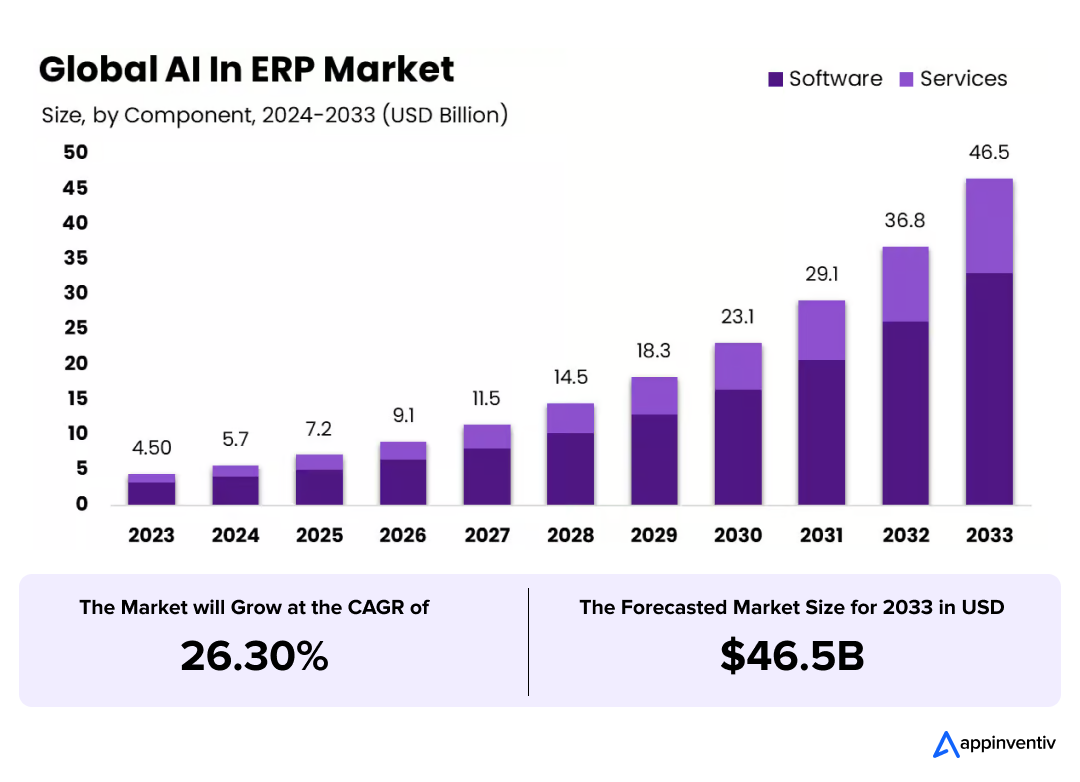
The journey ahead may be intimidating for organizations seeking to leverage the combined power of AI and ERP to automate routine processes and improve decision-making. If you’re unsure where to start or how to stage such innovations efficiently, this article will provide you with the information and knowledge to get started and navigate this revolution.
The AI in ERP market is skyrocketing to $46.5B by 2033 with a 26.3% CAGR. Automate, optimize, and dominate.
Intelligent ERP systems are the backbone of modern organizations, streamlining critical functions such as finance, supply chain, human resources, and customer relationship management. However, traditional ERP systems often face challenges like complex interfaces, siloed data, and reliance on manual processes.
The integration of Artificial Intelligence (AI) into ERP systems addresses these pain points, transforming how businesses operate in the hyper-competitive global markets of 2025.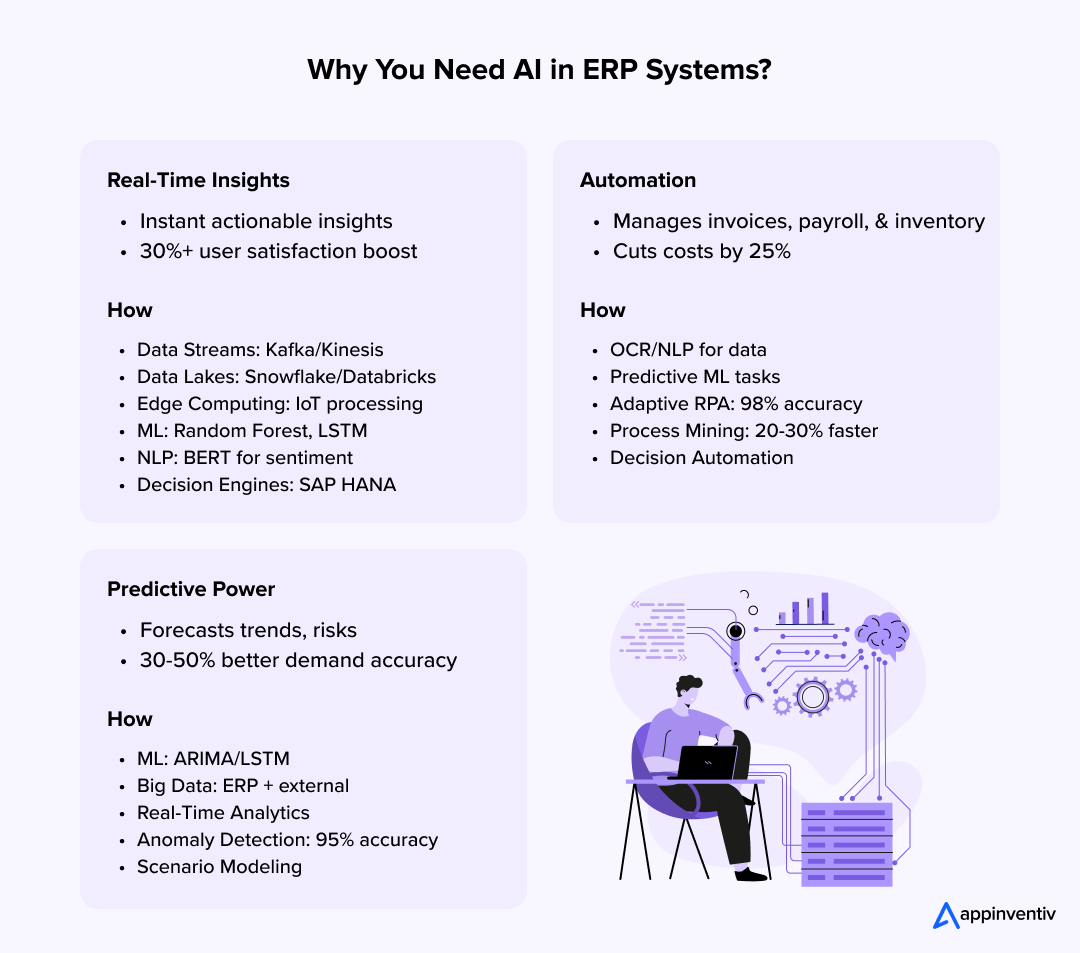
AI empowers ERP systems to process massive datasets in real-time, delivering actionable insights that drive faster and more informed decisions. Machine learning algorithms analyze historical and live data from across the enterprise, identifying patterns and trends that humans might overlook.
That’s why businesses adopting AI-driven ERP solutions have experienced over a 30% increase in user satisfaction.
With the help of AI algorithms and data processing functions, ERP systems powered by machine intelligence transform raw enterprise data into actionable insights that can be applied to various business functions. Here’s how:
1. Data Ingestion and Processing
Bonus Read: What is Edge Computing and Why It Matters to Enterprises?
2. Machine Learning and Analytics
3. Natural Language Processing (NLP)
The NLP models, such as BERT and GPT, scan the unstructured data available in an ERP system (e.g., customer feedback or contracts) and infer sentiment, intent, or compliance risks. An example: To prioritize high-risk escalations, the NLP applications for modern enterprises can potentially handle customer support ticket processing in real-time.
4. Real-Time Decision Engines
The ERP systems powered by AI leverage decision engines that integrate business rules with predictive models to provide recommendations. For example, the SAP HANA platform incorporates AI, enabling it to provide real-time recommendations for replenishing inventory based on market corrections and internal data.
AI automates repetitive and time-consuming tasks, such as invoice processing, payroll management, and inventory tracking. By utilizing Robotic Process Automation (RPA) in conjunction with AI, ERP systems can efficiently handle these tasks with minimal human intervention, thereby reducing errors and operational costs.
According to research by McKinsey, AI automation in ERP environments can reduce operating costs by up to 25%.
ERP with AI integration expands the role of robotic process automation (RPA) in ERP systems, enabling the anticipation of dynamically adapting intelligent task handling that is no longer based solely on rule scripting. The major mechanisms are:
AI’s predictive analytics enable ERP systems to forecast market trends, customer behavior, and operational risks. For instance, AI can predict demand fluctuations based on historical sales data, seasonal trends, and external factors like economic indicators. This allows businesses to optimize inventory, adjust pricing strategies, and mitigate risks before they escalate.
The McKinsey report indicates that predictive analytics in ERP systems can significantly improve demand forecasting accuracy by 30 to 50%.
An AI-powered ERP system leverages AI to harness the power of non-trivial algorithms, anticipating trends and enabling proactive decision-making. Key mechanisms include:
With the world’s markets becoming increasingly competitive, AI-driven ERP systems are no longer a luxury but a necessity. They enable organizations to optimize operations, reduce expenses, and remain competitive.
Bonus Read: AI Analytics for Businesses – Benefits, Use Cases, and Real Examples
An intelligent ERP artificial intelligence system enables the performance of business operations, the making of informed decisions, and the driving of business development. Such systems utilize machine learning, predictive analytics, and automation to streamline processes in all industries. Different types of ERP AI systems enhance capabilities and are leveraged across various business-specific applications.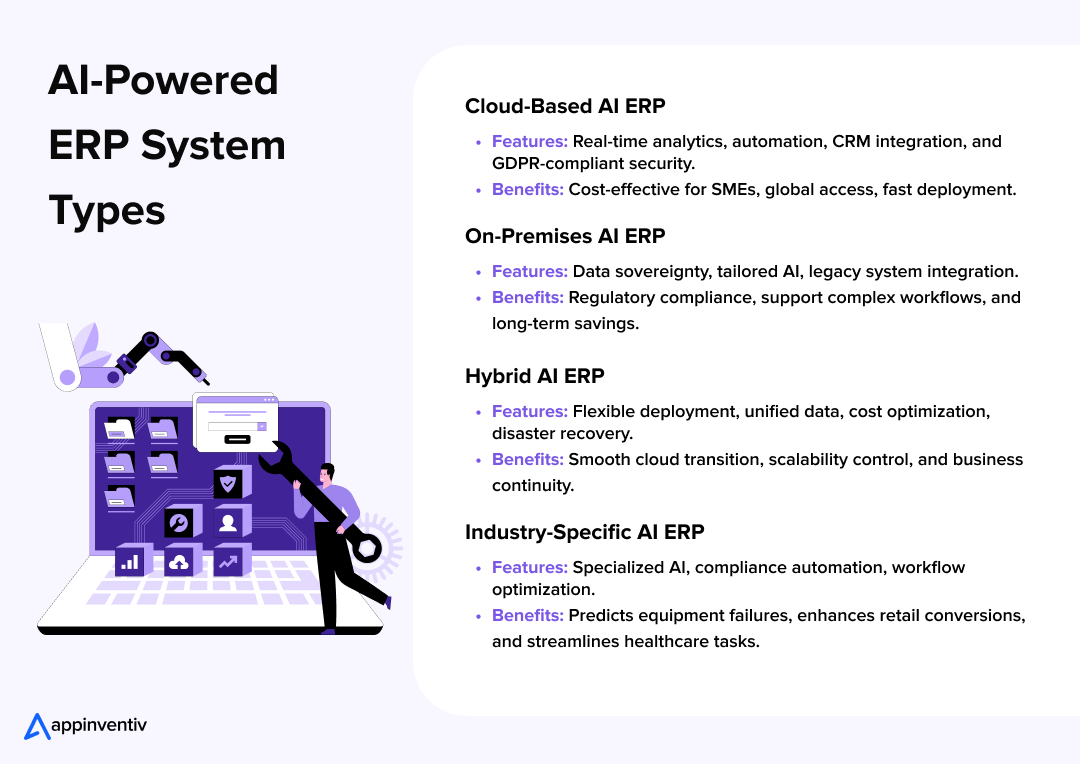
The cloud ERP AI systems are located on off-site servers, which are scalable, accessible, and provide real-time, up-to-date information. They minimize the upfront costs of infrastructure and seamlessly integrate with other cloud services, making them best suited for companies that prioritize agility and cost efficiency.
Bonus Read: How can enterprises protect their data in cloud environments?
On-premises ERP AI systems are deployed on company servers, providing the highest level of control over data, customization, and security. They are suitable when an organization has stringent regulatory requirements or a complex and proprietary workflow.
Hybrid AI-powered ERP systems are a combination of cloud and on-premises deployment types, offering flexibility to leverage the benefits of the cloud while maintaining control over critical data. They are best suited for companies transitioning to the cloud or those requiring a balance between innovation and support for legacy systems.
Industry-specific AI ERP systems are tailored to the unique needs of sectors like manufacturing, retail, healthcare, or construction. They incorporate AI to address niche challenges, such as regulatory compliance, supply chain complexity, or customer engagement.
In a world where information has become the currency and speed is the determinant of success, AI is revolutionizing Enterprise Resource Planning (ERP) systems into powerful mechanisms of innovation.
By incorporating AI into ERP, companies can access previously unimaginable levels of automation, intelligence, and responsiveness, potentially transforming their operations in a highly competitive, globalized market. Whether it is forecasting demand to the most precise detail or automating highly complex business processes, real-time understanding of anomalous behavior and AI-driven enterprise resource planning use cases are doing more than just increasing efficiency.
Below is an in-depth exploration of practical AI-driven ERP use cases, demonstrating how AI enhances ERP systems and their potential outcomes.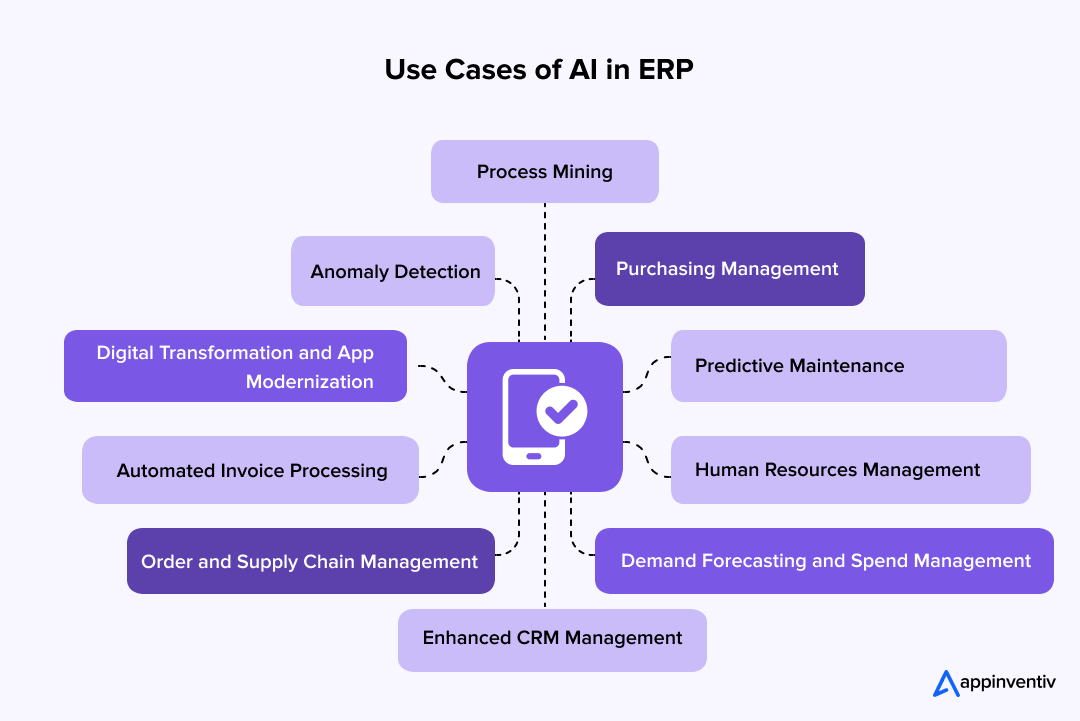
AI in ERP systems accelerates digital transformation by modernizing legacy systems, integrating cloud-based solutions, and enabling real-time data processing. AI-driven ERP platforms enhance agility, scalability, and user experience by automating manual processes and providing intelligent insights.
AI enhances demand forecasting by analyzing historical sales data, market trends, and external factors like economic indicators and weather patterns. In spend management, AI optimizes procurement budgets and identifies cost-saving opportunities.
Bonus Read: How to Build an Intelligent AI Model: An Enterprise Guide
AI can be used to optimize order processing and supply in a business, predict disruptions, automate procedures, and improve the efficiency of their logistics.
Unlock the story behind a 60% boost in visibility for a global manufacturer using cutting-edge AI & Analytics.
AI-driven predictive maintenance utilizes IoT sensor data and historical equipment performance to forecast failures before they occur, thereby reducing downtime and maintenance costs.
AI enhances Customer Relationship Management (CRM) within ERP systems by personalizing customer interactions, predicting churn, and automating sales processes.
AI streamlines HR processes within ERP systems by automating recruitment, talent management, and employee engagement tasks.
AI automates invoice processing by extracting data, validating invoices, and detecting discrepancies, reducing manual errors and processing times.
Bonus Read: Integrating AI in Cybersecurity: Automating Enterprise With AI-Powered SOC
AI optimizes purchasing by analyzing supplier performance, predicting price fluctuations, and automating procurement workflows to enhance efficiency.
AI effectively identifies anomalies in ERP data, such as financial transactions and inventory records, to prevent fraud, errors, and operational inefficiencies.
Also Read: Financial Fraud Detection Using Machine Learning: A Comprehensive Guide
AI-driven process mining analyzes ERP data to map business processes, identify inefficiencies, and suggest improvements.
This convergence of AI and ERP systems represents a significant paradigm shift in streamlining organizational structure, enhancing decision-making, and strengthening competitive advantage. Integrating AI functions into ERP systems enables businesses to predict, simplify complex processes, and facilitate resource planning across various functions, including finance, supply chain management, and customer relationship management.
Nevertheless, successful AI implementation in ERP requires a strategic plan, which includes clear objectives, effective use of data, and close technological-business alignment.
Explore a practical, step-by-step guide on how to integrate AI into ERP, drawing on solid, expert knowledge and real-life considerations to achieve the best results and measurable outcomes.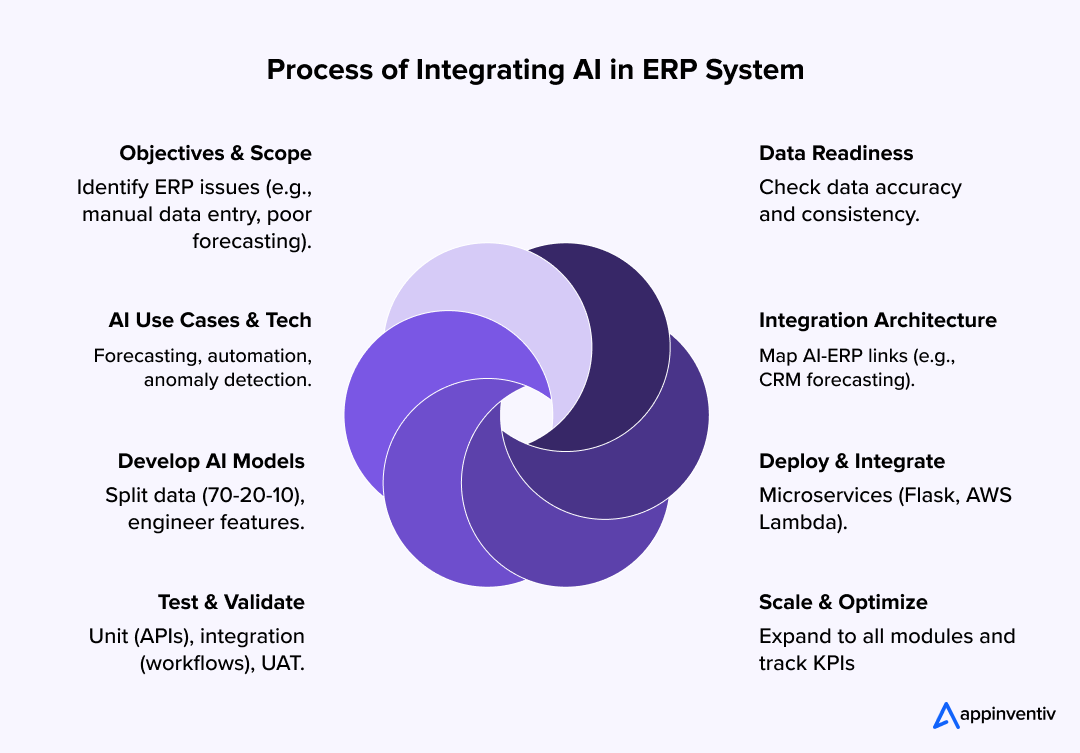
Establish clear goals for integrating AI into your ERP system to align with business needs and avoid scope creep.
AI thrives on quality data. Ensure your ERP system’s data is clean, accessible, and structured for AI use.
Tools:
Also Read: AI in Data Governance: Reshaping Enterprise Data Strategy
Choose specific AI applications and tools that align with your ERP objectives and infrastructure.
Identify AI Use Cases: Common ERP-AI integrations include:
Choose AI Technologies:
Evaluate Compatibility: Ensure AI tools integrate seamlessly with your ERP system via APIs, SDKs, or native connectors.
Proof of Concept (PoC): Start with a small-scale PoC (e.g., AI-based demand forecasting for one product line) to validate feasibility and ROI before full deployment.
Tools:
Create a robust technical framework to connect AI systems with your ERP environment.
Tools:
Also Read: On-Premise vs. Cloud: A Detailed Analysis
Build or customize AI models tailored to your ERP use cases.
Tools:
Operationalize AI models by embedding them into ERP workflows.
Tools:
Bonus Read: Exploring the Power of AI in Interactive Data Visualizations
Ensure the AI-ERP integration is reliable, accurate, and secure before implementing it fully.
Tools:
Also Read: AI in Quality Assurance: The Next Stage of Automation
Roll out the integration across the organization and continuously improve performance.
Tools:
Integrating AI in ERP systems depends on the project scope, complexity, and organizational requirements, which, therefore, have different costs. The most important cost factors of AI-ERP integration are briefly described below:
Additional Costs
Connect with our AI experts to receive a clear, tailored cost estimate and bring your vision to life as a cutting-edge reality.
The future of AI-driven ERP systems is poised for significant advancements, driven by emerging technologies and evolving business needs. Below are key trends and predictions for 2025 and beyond:
1. Greater Autonomy and Decision-Making: ERP systems will increasingly operate with greater autonomy, with AI handling complex decision-making processes such as supply chain optimization and dynamic pricing.
2. Integration with Emerging Technologies
Bonus Read: Blockchain for Enterprise: Use Cases, Features, and Potential Challenges
3. Conversational AI and User Interfaces: Conversational AI tools will make ERP systems more accessible to non-technical users.
4. Sustainability and ESG Goals: AI-powered ERP systems will enable organizations to meet their environmental, social, and governance (ESG) goals by analyzing carbon emissions and optimizing resource utilization.
5. Hyper-Personalization and Industry-Specific Solutions: AI will enable ERP systems to offer hyper-personalized experiences tailored to specific industries, such as healthcare, retail, or manufacturing.
The integration of AI in ERP systems is transforming the way businesses operate, streamlining operations and driving innovation. Finding the right technology partner is crucial to ensure ease of integration, scalability, and future prosperity.
Our bespoke ERP Software Development Services help you to tackle this complex task. With nearly 10 years of experience under our belt, a team of over 1,600 tech specialists, and a proven track record of delivering more than 3,000 digital solutions, we leverage scalable aspects to develop the most advanced and AI-inclusive ERP systems tailored to your business.
At Appinventiv, we have expertise in both AI and ERP development. Our multidisciplinary team of over 1,600 technology evangelists possess proficiency in AI, machine learning, natural language processing (NLP), computer vision, and other emerging tech trends, enabling us to craft your enterprise software development and deliver no-code solutions meticulously.
Key Areas of Competencies:
Appinventiv’s leadership in the tech industry is evident in its numerous accolades, client testimonials, and thought leadership in artificial intelligence ERP development. The company has been recognized as a top performer by reputable organizations and maintains a strong presence in the digital transformation space.
Trust is the cornerstone of any successful partnership, and Appinventiv builds trust through ethical practices, transparent processes, and a client-centric approach. Their commitment to delivering secure, compliant, and high-quality solutions ensures that businesses can rely on them for AI-ERP integration.
By choosing Appinventiv as your technological partner for AI-ERP integration, you ally with a company that embodies professionalism, competence, authority, and reliability. Our success, extensive industry experience, and proven track record of delivering secure solutions make us the optimal choice for businesses seeking to transform their operations through AI-powered ERP systems.
Schedule a meeting today with the Appinventiv team to begin your new AI-ERP adventure and join a new era of efficiency and development.
Q. How does AI improve ERP systems?
A. AI enhances ERP systems by automating repetitive tasks, improving data analysis, and enabling predictive capabilities. It streamlines processes like inventory management, financial forecasting, and supply chain optimization through machine learning algorithms that identify patterns and optimize workflows.
AI-powered chatbots and virtual assistants improve user interaction by providing real-time insights and support. Additionally, AI enables better decision-making with predictive analytics, anomaly detection, and personalized reporting, leading to increased efficiency, reduced errors, and enhanced scalability.
Q. How much does it cost to integrate AI into ERP systems?
A. The cost of integrating AI into ERP systems varies widely based on factors like the complexity of the AI solution, the ERP platform, data infrastructure, and whether custom development or off-the-shelf AI tools are used.
Basic integrations, such as adding AI-driven analytics, may range from $50,000 to $200,000. More advanced implementations, including custom machine learning models or extensive data restructuring, can cost $500,000 to $2 million or more. Ongoing costs for maintenance, cloud services, and updates should also be considered, typically 15-20% of the initial investment annually.
Q. What are some practical examples of AI in ERP systems?
A. AI in ERP systems enhances efficiency and decision-making. Examples include:
Q. What are the challenges of integrating AI into ERP?
A. Challenges include:
Q. How long does it take to integrate AI into ERP?
A. The timeline for AI integration into ERP systems depends on the scope and complexity. Basic integrations, like adding AI-powered analytics or chatbots, may take 3-6 months. Comprehensive projects, such as embedding machine learning for supply chain optimization or developing custom AI models, can take 12-24 months. Key phases include:
Q. What are the key AI features in ERP systems that enhance business operations?
A. AI features in ERP systems include predictive analytics for demand forecasting, intelligent process automation for streamlining workflows, natural language processing for improved user interaction, and machine learning for optimizing supply chain and financial decisions. These capabilities drive efficiency, reduce costs, and enhance decision-making.
Q. What are the risks of integrating AI into enterprise ERP?
A. Risks include:
Chirag Bhardwaj is a technology specialist with over 10 years of expertise in transformative fields like AI, ML, Blockchain, AR/VR, and the Metaverse. His deep knowledge in crafting scalable enterprise-grade solutions has positioned him as a pivotal leader at Appinventiv, where he directly drives innovation across these key verticals. Chirag’s hands-on experience in developing cutting-edge AI-driven solutions for diverse industries has made him a trusted advisor to C-suite executives, enabling businesses to align their digital transformation efforts with technological advancements and evolving market needs.
How Generative AI is Powering Digital Product Development – 10 Use Cases, Benefits, and Real Examples
Key takeaways: Ranging from rapid prototyping through automated coding, Generative AI enables teams to speed up product delivery to market, with fewer resources and higher productivity. By using predictive analytics and real-time data, Generative AI helps teams make effective decisions prior to initiating the actual development based on data, which enhances the product-market fit and…
AI Agents in Customer Service: The Future of Seamless Customer Interactions
Key takeaways: AI agents are redefining the customer service experience by providing round-the-clock availability and instant responses. They personalize every interaction, making customers feel truly heard and valued. By taking over repetitive tasks, these agents help businesses reduce manpower costs while boosting operational efficiency. The best part? AI agents keep learning and improving. With every…
Chatbots vs. Conversational AI: Which One is Right for Your Business?
Key takeaways: Chatbots use rule-based logic for simple, predictable tasks. Conversational AI leverages ML and NLP for dynamic, human-like interactions. Scalability is higher with conversational AI for complex, multi-turn dialogues. The cost of chatbots is lower initially, but AI offers better long-term ROI. User Experience is enhanced with conversational AI’s personalized engagement. You have seen…
B-25, Sector 58,
Noida- 201301,
Delhi – NCR, India
79, Madison Ave
Manhattan, NY 10001,
USA
Appinventiv Australia,
East Brisbane
QLD 4169, Australia
3rd Floor, 86-90
Paul Street EC2A 4NE
London, UK
Tiger Al Yarmook Building,
13th floor B-block
Al Nahda St – Sharjah
Suite 3810, Bankers Hall West,
888 – 3rd Street Sw
Calgary Alberta
Full stack mobile (iOS, Android) and web app
design and development agency
Appinventiv is the Registered Name of Appinventiv Technologies Pvt. Ltd., a mobile app development company situated in Noida, U.P. India at the street address – B- 25, Sector 58, Noida, U.P. 201301.
All the personal information that you submit on the website – (Name, Email, Phone and Project Details) will not be sold, shared or rented to others. Our sales team or the team of mobile app developers only use this information to send updates about our company and projects or contact you if requested or find it necessary. You may opt out of receiving our communication by dropping us an email on – info@appinventiv.com
1600+ transformation engineers delivered
3000+ game-changing products.
We chose Appinventiv to build our financial literacy and money management app from start to finish. From the first call, we were very impressed with Appinventiv’s professionalism, expertise, and commitment to delivering top-notch results.
It has been a pleasure working with Appinventiv. The team is not only extremely versatile and competent but also very professional, courteous, and responsive. We certainly plan to continue working with Appinventiv for an indefinite period.
We took a big leap of faith with Appinventiv who helped us translate our vision into reality with the perfectly comprehensive Edamama eCommerce solution. We are counting to get Edamama to launch on time and within budget, while rolling out the next phase of the platform with Appinventiv.
I just want to take a moment to thank the entire Appinventiv team for your incredible support. We truly appreciate everything you’ve done, and we’re excited to continue working together as we grow here at KODA
After researching numerous companies, we finally found Appinventiv, and it was the best decision we could have made. They successfully addressed the challenges with our existing app and provided solutions that exceeded our expectations.
We approached Appinventiv with a clear vision to build a robust and future-ready platform that could seamlessly integrate with the busy lifestyle of our customers while uplifting their overall experience and giving us a competitive edge.
1600+ transformation engineers delivered
3000+ game-changing products.
Connect with our consultation experts to get:
Insights specific to your business needs
Roadmap to overcome your challenges
Opportunities to scale your business in this niche.
